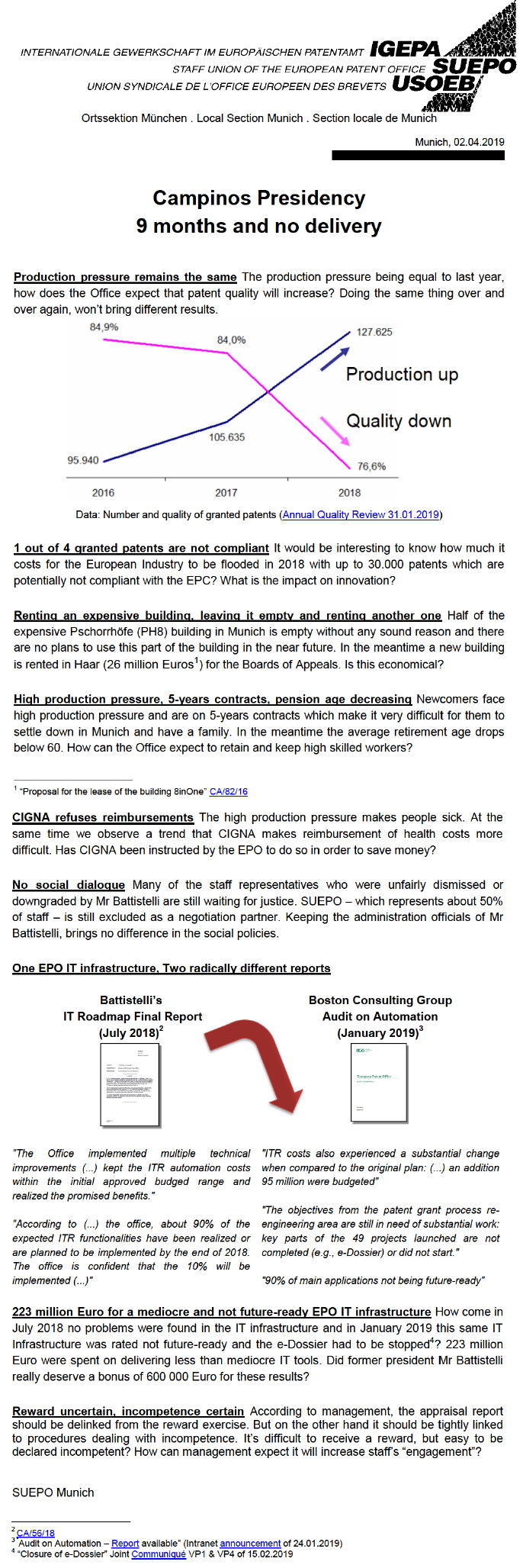

THE European Patent Office (EPO) very well knows that it is granting a lot of fake patents or IPs (Invalid Patents) rather than European Patents. Like the USPTO, especially in recent decades (35 U.S.C. €§ 101 has slowed things down a bit), the EPO does not seem to mind patent quality, only raw numbers. António Campinos even promotes illicit software patents in his blog.
"In the European courts, citing the EPC as usual, more European Patents turn out to be invalid."Years ago we heard stories about European patent examiners who had granted Apple patents against their will (management's pressure), knowing that Apple is a "big client", so even though evidence suggests applications ought to be rejected patents get granted anyway. Yesterday a Web site dedicated to Apple patents said this:
Earlier today Patently Apple discovered a patent application from Apple in the European Patent Office database. Digging deeper into the documentation I discovered that Apple had acquired the entire worldwide right, title and interest in the listed patents from Tueo Health Inc. as noted in-part from the document presented below.
Apple has acquired a new patent which describes technology able to monitor your health conditions while you are asleep outside of a standard mobile device or smart watch.
As spotted by Patently Apple, a patent registered by the European Patent Office (EPO) reveals the acquisition of a design from Tueo Health Inc.
"One thing isn't in doubt though; the lawyers are loving it because they profit from the war."Another term the EPO likes to name-drop (in the context of search or patenting) is "blockchain" and for this too -- like "AI" -- the EPO set up a whole event featuring patent trolls. Speaking of trolls, Watchtroll continues to pretend -- as recently as yesterday in fact -- that software patents are magically OK if one rides hype waves like "blockchain". And also on the subject of trolls, the patent trolls' boosters from Bristows (Annsley Merelle Ward) are again pushing the agenda of a Microsoft-armed patent troll (in IP Kat yesterday), MOSAID/Conversant. She gave away her bias in a recent blog post. They -- like the EPO -- want the trolls of the world to come to Europe; it's not their problem when innocent parties get dragged into court. The more litigation, the better, irrespective of the underlying merits (or lack thereof).
In the European courts, citing the EPC as usual, more European Patents turn out to be invalid. Vidal-Quadras & Ramon's Oriol Ramon has just given this example:
By virtue of a Judgement dated 29 March 2019, the Court of Appeal of Barcelona upheld the Judgement of 20 February 2017 ruled by the Commercial Court No. 1 of Barcelona that revoked the Spanish part of European patent EP 1 379 220 (EP’220).
The plaintiff filed proceedings for revocation of EP’220 due to lack of novelty and inventive step.
In the reply to the revocation suit, the patentee did not defend the patent as granted by the EPO but filed a counterclaim based on Article 138.3 EPC limiting the patent and requesting the revocation action to be dismissed and the patent to be maintained as amended.
The plaintiff then petitioned the counterclaim to be dismissed because the patent in its limited version did not meet the requirements for added subject-matter (Article 123.2 EPC) and inventive step (Article 56 EPC), as, according to the prior art, it was still obvious to a person skilled in the art.
[....]
Neither the Order dated 15 October 2018 nor the Judgement mentioned hereby assessed a further issue: Whether a voluntary request for limitation of a European patent can be filed in the national patent offices or whether it must be filed in the EPO in order to preserve, when possible and as a general principle, the unitary text of the European patent (Article 118 EPC). In fact, the Act revising the EPC introduced a central procedure for administrative limitation by the EPO (Article 105 bis EPC): “At the request of the proprietor, the European patent may be revoked or be limited by an amendment of the claims. The request shall be filed with the European Patent Office in accordance with the Implementing Regulations”.
The judgement is not yet final as an appeal in cassation and an extraordinary appeal for procedural infringement have been lodged by the patentee with the Supreme Court.